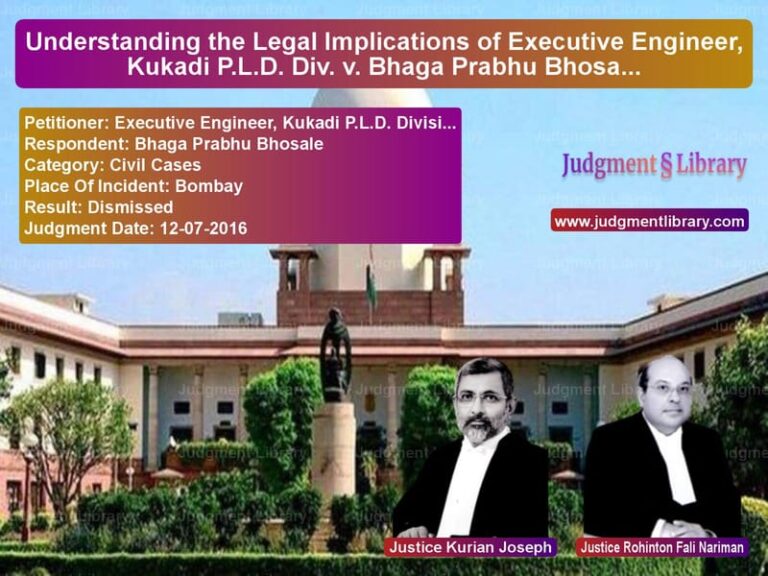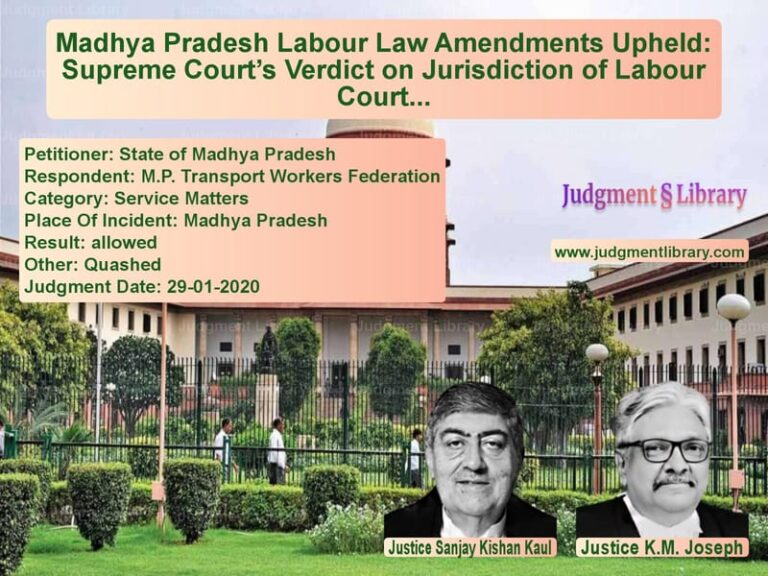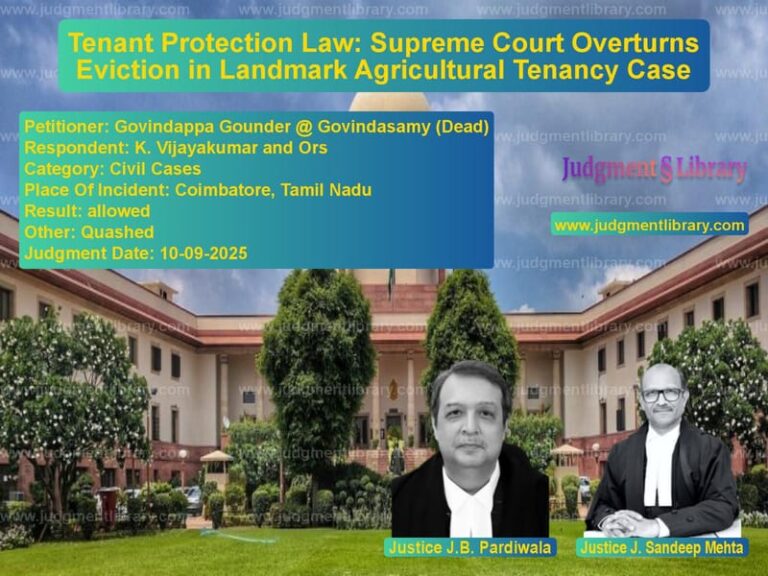Partition and Sale of Ancestral Property: Supreme Court’s Ruling on Legal Necessity and Antecedent Debt
The case of Rengan Ambalam and Anr. vs. Sheik Dawood and Ors. raises important legal questions regarding the sale of ancestral property under the doctrine of legal necessity and antecedent debt. This judgment clarifies the circumstances in which a father, as the manager of a Hindu joint family, can alienate property and whether such an alienation is binding on all coparceners.
The dispute originated when the plaintiff sought partition of his ancestral property, claiming a one-third share in the family’s joint estate. The plaintiff contended that his father, who was acting against his interests, had unilaterally mortgaged and sold a portion of the property to the third and fourth defendants, thereby depriving him of his lawful share. The respondents (purchasers of the property) defended the transaction by asserting that the sale was executed to repay a pre-existing debt, thereby qualifying as a legally valid sale.
Background and Case History
The litigation began with the plaintiff, Rengan Ambalam, filing a suit in the Sub-Court, Pudukkottai, seeking partition and possession of his share in the family property. The plaintiff argued that the sale of the ‘B’ schedule property was illegal and not binding on him. He further alleged that his father had acted in bad faith by mortgaging the property for Rs.3,000 and subsequently selling it to defendant Nos. 3 and 4. The plaintiff maintained that since he had not consented to the sale, it could not be enforced against his interests.
The defendants, however, asserted that the sale was executed for a lawful purpose and was binding on all members of the joint family, including the plaintiff. According to them, the mortgage and subsequent sale were necessary to clear debts incurred by the family and that the father, as the manager, had the legal right to carry out the transaction.
Petitioner’s Arguments
The petitioner, represented by Senior Advocate Shri R. Venkataramani, raised the following arguments:
- The High Court committed an error by overturning the concurrent findings of the Trial Court and the First Appellate Court.
- The mortgage debt, which was created in 1981 and discharged through a sale in 1983, could not be classified as antecedent debt because such debt must be independent of and prior in time to the transaction in question.
- The sale was executed with the intent of depriving the plaintiff of his rightful share in the property, making it legally unenforceable.
- There was already a division in status between the plaintiff and his father, which meant that the father could not have acted as the manager of a joint family to execute the sale.
- Defendant Nos. 3 and 4 were not bona fide purchasers, as they were aware of the existing dispute at the time of purchase.
- Since the sale deed lacked adequate consideration, it was void and could not be enforced.
Respondent’s Arguments
The respondents, represented by Advocate Shri Vikas Singh, argued that:
- The mortgage and sale were undertaken due to financial difficulties faced by the family.
- The transactions were necessary to clear pre-existing debts, which qualified them as acts of legal necessity.
- The father was within his rights as the manager of the Hindu joint family to sell the property, and therefore, the sale was binding on all coparceners.
- The High Court correctly analyzed the documentary evidence and legal principles before ruling in favor of the purchasers.
Supreme Court’s Analysis
The Supreme Court examined whether the sale of the property could be justified under legal necessity and antecedent debt. It focused on:
- The nature of the debt and whether it was truly antecedent.
- Whether the father had the legal authority to alienate the property.
- Whether the transaction was executed in good faith and with adequate consideration.
The Court reviewed key documentary evidence, including the mortgage deed, the lease agreement, and the sale deed. The records showed that:
- The property was mortgaged in 1981 for Rs.3,000.
- The mortgagee was subsequently paid Rs.1,000 to extend the lease agreement.
- The sale deed of 1983 explicitly stated that a portion of the sale proceeds was used to clear the mortgage debt.
Key Judicial Findings
In delivering its judgment, the Supreme Court held:
- Since the mortgage was executed for family expenses and later cleared through the sale, it qualified as antecedent debt.
- The sale transaction had a direct connection with the repayment of the mortgage, making it a valid sale under the doctrine of legal necessity.
- The High Court had correctly exercised its jurisdiction under Section 100 CPC in overturning the lower courts’ findings, as substantial questions of law were involved.
- The sale was binding on the plaintiff, even though he did not explicitly consent to it.
Conclusion and Impact
The Supreme Court’s ruling provides clarity on the rights of a father managing a Hindu joint family. It reaffirms that if a sale is executed to clear antecedent debt and is for legal necessity, it remains binding on all family members, even in the absence of explicit consent from all coparceners.
This judgment serves as an important precedent in cases where family property is sold under claims of financial necessity, balancing the rights of individual coparceners against the legal authority of a father managing the estate.
Petitioner Name: Rengan Ambalam and Anr..Respondent Name: Sheik Dawood and Ors..Judgment By: Justice L. Nageswara Rao, Justice M.R. Shah.Place Of Incident: Pudukkottai, Tamil Nadu.Judgment Date: 09-05-2019.
Don’t miss out on the full details! Download the complete judgment in PDF format below and gain valuable insights instantly!
Download Judgment: Rengan Ambalam and A vs Sheik Dawood and Ors Supreme Court of India Judgment Dated 09-05-2019.pdf
Direct Downlaod Judgment: Direct downlaod this Judgment
See all petitions in Property Disputes
See all petitions in Succession and Wills
See all petitions in Landlord-Tenant Disputes
See all petitions in Judgment by L. Nageswara Rao
See all petitions in Judgment by Mukeshkumar Rasikbhai Shah
See all petitions in dismissed
See all petitions in supreme court of India judgments May 2019
See all petitions in 2019 judgments
See all posts in Civil Cases Category
See all allowed petitions in Civil Cases Category
See all Dismissed petitions in Civil Cases Category
See all partially allowed petitions in Civil Cases Category







